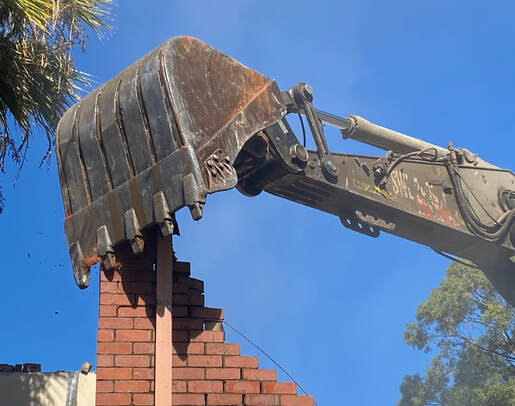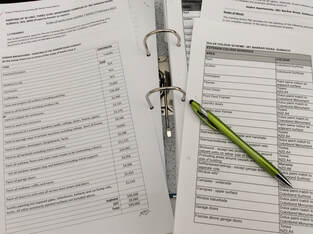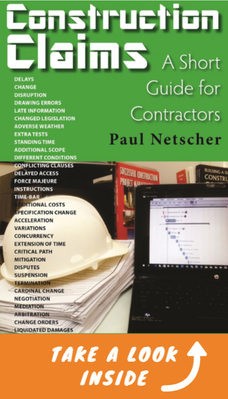|
Over the last 3 weeks we have discussed the impact of clients (How can clients ensure their projects meet their expectations?), the design team (How designers can make construction projects more successful) and the owner’s project manager (How can the owner’s Project Manager ensure the success of their construction project) on the success of construction projects. "Many construction projects are destined to fail before they even start" Yet, many construction projects are destined to fail before they even start. In this article I discuss the owner’s pricing (tender) or bidding documentation which they issue to construction companies so they can formulate a price to carry out the work. Project pricing or bid documentationThe purpose of this documentation is to provide sufficient information to construction companies so that they can accurately price the construction work. Together with this information the contractors should also be provided with information relating to the contract conditions and project site conditions so they understand how the project will be administered, what is expected of them and what they can expect from the owner and their representatives. #constructionprojects #contractdocumentation What happens if the pricing information is poor?Owners, or their representatives, normally request contractors to price the construction project based on drawings and documentation they issue to them – the tender or bidding documentation. Unfortunately often this documentation is incomplete, incorrect and shoddy or has contradictory information. Sometimes the final facility constructed is radically different to the one proposed in the pricing or tender documentation, which gives rise to project variations (change orders), delays and disputes. "Providing inaccurate or incomplete project information will create problems on the project" Providing incomplete pricing information, inaccurate information, or information of a poor quality, creates a number of problems and risks to both the owner, the project and the contractor: 1. Some potential contractors may be put-off from pricing the construction project, thus reducing the number of bids or quotations, because:
2. Contractors may make certain assumptions. These assumptions could make their price more expensive than it should be – for instance the owner may be providing water and electricity for construction, but if this isn’t stated in the pricing documentation provided then the contractor may include for the provision of these in their price. 3. If contractors have to guess something or assume something in their price they may add in an extra contingency to cover the risk of an incorrect guess. This makes construction prices more expensive. 4. Any changes to the scope, documentation, specifications or further additional information given to the contractor after they have submitted their quotation or price could give them reason to ask for a variation (change order). This can add to both the cost and the time of the construction project. 5. Ambiguities and contradictions in the project pricing documentation may give rise to disputes and variations later. 6. Some contractors may misunderstand the documentation, leading them to incorrectly price items or omit them completely, which leads them to submit an overall price lower than they should. Awarding the project to a contractor whose price is too low could lead to problems later should the contractor become bankrupt or default on the contract. 7. Because of poor documentation, contractors may add numerous clarifications and exclusions to their bid. This can:
What should be included in the owner’s tender or bid request?So what should be included in the project pricing documentation to enable construction companies to formulate their price? 1. A full Scope of Works for the portion of works the contractor must carry out. 2. Milestone dates which indicate access dates, information issue dates and sectional and final completion dates. Preferably a construction schedule should be included. This should also include any interruptions to work and requirements to complete work after the owner and their other contractors have completed work. 3. Project specifications. 4. Sufficient information or detailed drawings to enable the work to be accurately priced. 5. Special project conditions which may include limited working hours, access requirements, working with other contractors, etc. 6. Detail the terms of the contract, which would include, payment conditions, sureties, warrantees, and retention monies. It’s usually best to include the conditions that will be used in the final contract. 7. Contain the relevant site data and conditions, which may include site surveys, ground conditions, etc 8. Project specific safety and environmental requirements. 9. Clearly state what the contractor must provide and what they will be provided, and by when. This may include services (like power and water), cranes, security, insurance and scaffolding. 10. Specific quality requirements and testing. 11. Commissioning requirements and spare parts necessary. 12. Specific requirements the contractor may have to comply with, such as providing particular staff or equipment. 13. By when the price is required, who it must be addressed to, what must be included with the price, the format of the documentation and where it must be delivered to. How long should contractors have to price a project?Unfortunately many clients provide too little time for contractors to accurately price construction projects. The risk of this is that: 1. Contractors decline to price the project because of insufficient time which then limits the competition. 2. Contractors don’t have sufficient time to obtain the best quotations from their suppliers and subcontractors, which means their price is higher than it could be. 3. Contractors have insufficient time to price the work so they add contingencies which inflate their price to cover items they were unable to price accurately. 4. They are unable to fully develop alternative methods or materials which may have lowered their price "Allow sufficient time for contractors to submit an accurate price." The length of time required to price a construction project accurately will depend on: 1. The size and complexity of the construction project. 2. The level of detail supplied by the owner in their bidding documentation. 3. The level of detail the owner expects to receive with the contractor’s price. 4. The amount of design and specialised procurement that the contractors have to undertake to formulate their price. 5. The level of work in the construction industry. If construction companies are all busy with pricing projects it may mean that new bids can’t be started immediately. 6. The location of the project – projects in remote regions or other countries may take longer to price as construction companies may not be familiar with the local resources, conditions and subcontractors in the area. Owners should consider asking their targeted contractors how much time they’ll require to price the project.
Time spent on preparing sound project documentation will pay dividends"Project scope and design details should be firmed up before contractors price the project" 1. Owners should engage professionals to prepare the tender/pricing documentation and project contract. 2. This documentation must be reviewed to ensure it is complete, accurate and unambiguous. 3. They should ensure the construction project scope of works and design details and project information has been firmed up so there won’t be too many changes later. 4. They must allow sufficient time for contractors to formulate an accurate price. Often owners rush the tender or bidding process. Time and money spent delaying this process to ensure construction companies have the best and complete information to price the construction project is often time well spent. This will save additional costs and delays during construction. Proper project pricing documentation is invaluable, and can avoid many of the disputes we see on construction projects today. In the next article Why owners sometimes employ the wrong contractor we discuss the role of the price Tender) or bid adjudication process. "This is a fantastic book to get a realistic and detailed idea of construction management" commented one reader. Other useful articles by the author Choosing a subcontractor Project documentation Project scheduling – the relationship between time and cost (Written by Paul Netscher the author of the acclaimed books ‘Successful Construction Project Management: The Practical Guide’ and ‘Building a Successful Construction Company: The Practical Guide’. Both books are available in paperback and e-book from Amazon, other online stores and retail outlets - Order your copy now. This article includes information from a third book which will be published later this year)
© 2022 This article is not to be reproduced for commercial purposes without written permission from the author. construction management construction project management
7 Comments
Mark Wylie
13/6/2015 10:47:41 am
A good article Paul, which identifies some of most important ways in which owners can help ensure that their project is a success. I tried responding to the post on LinkedIn, but had trouble doing so, so have left my comments here for you to consider.
Reply
Paul
14/6/2015 02:58:18 am
Mark thanks for your in depth reply. You make many good comments. Especially the one about when the contractor submits their own construction schedule it demonstrates to the client that they actually understand the project and have thought through their construction methodology.
Reply
Paul
18/6/2015 02:00:07 am
Francis it's a pity more owners didn't read your comments. They would then understand how their poor bidding documents are reducing the number of prices they receive. Unfortunately those that do price these projects are often the more inexperienced contractors.
Reply
17/6/2015 10:18:22 pm
For those that are fully in the industry either as contractors or owners; it is difficult to have a comprehensive and perfectly accurate tender document compiled from scratch for a each project. However, well thought out templates could be adopted for project types, these will then be modified to suit specific projects.
Reply
Paul
18/6/2015 01:57:34 am
Thanks Olugbenga for your insightful comments. I agree.
Reply
25/3/2022 11:12:08 am
I appreciate how this post mentioned the importance of knowing the owner wants to be able to price the project accurately. My friend is planning to hire a commercial general contracting firm to build his dream commercial space. I should advise him to make sure he communicates his desires to the contractor.
Reply
Leave a Reply. |
Archives
June 2024
Note: We welcome genuine comments, especially comments that add additional information to the subject matter in the article. We however reserve the right to remove inappropriate comments, which includes comments that have nothing to do with the subject, comments that include inappropriate language, and comments that are an advertisement for a product or company, or which include an advertising link. Comments must be in English. We will not enter into discussion on why a particular comment was removed.
CategoriesCopyright 2016 - The attached articles cannot be reproduced for commercial purposes without the consent of the author.
The opinions expressed in the attached articles are those of the writer. It should be noted that projects are varied and different laws and restrictions apply which depend on the location of the contractor and the project. It's important that the reader uses the supplied information taking cognisance of their particular circumstances. The writer assumes no responsibility or liability for any loss of any kind arising from the reader using the information or advice contained herein. "I have what I consider some of the best books on construction management."
Books are available from: Amazon.com Amazon.co.uk takealot.com kalahari.com Amazon.in Amazon.de Amazon.fr Amazon.it Amazon.com.au Powell's Fishpond uread bokus Amazon.ca Amazon.es Other retail stores Available in paperback or on Kindle "28 YEARS OF CONSTRUCTION PROJECT MANAGEMENT EXPERIENCE, DEVELOPING SUCCESSFUL CONSTRUCTION PROJECT MANAGERS AND BUILDING SUCCESSFUL CONSTRUCTION COMPANIES"
|










 RSS Feed
RSS Feed




